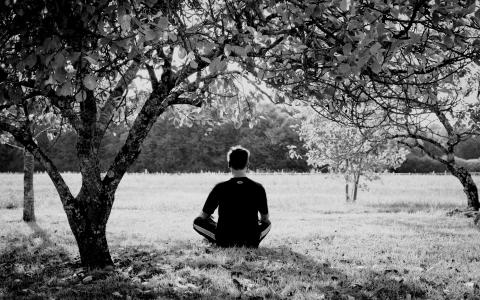
Note
sarvagatamirdum ātmaṃ
nirvikṛtaṃ sarvaśaktam adu niṣkarmam ।
nirvairaṃ sarvasamaṃ
nirvṛtidaṃ patrasumajalārpakariṃgam ॥
The ātmā, though all-pervading,
is immutable, and though omnipotent, is actionless.
It is without a rival, and is the same everywhere.
It yields supreme bliss to even those offering a leaf, a flower or water.
Summary
The objects of the world function because of Brahma. Because of this, we confuse those objects for...

The Importance of Feeling
During dhyāna, it is not syllables that are important, neither are sound or meaning. Feeling is paramount. The syllable is a means to bring the right feeling to the mind. Mūrtis and pictures of deities, worship with incense sticks and lamps are also the means to bring to mind the emotion associated with the divine. Therefore, the mind should be made to focus on the meaning of the syllable — the feeling associated with...

Note
Brahmavadeṃ jīvavadeṃ ।
Karmavadeṃ bhautadaivayajñaṃgaḻadeṃ ॥
Gamyavadeṃ dhyeyamadeṃ ।
Samyagbodhanéyanintu pārthaṃ beḍal ॥
What is Brahma? What is the jīva?
What is karma? What are the bhauta, daiva and yajñas?
What should the destination be? What should the goal be?
Asked thus Pārtha, for guidance full.
uttaravanéṃṭu keḻkéga-
mittu baḻikkéṃtu jīvamīśa-smṛtiyoḻ ।
cittaikāgrābhyāsadi-
nuttama-gati-gervudéṃdu hari bittaripaṃ...

Māyā
Why does this discernment of thought not exist normally in people? Bhagavān answers:
māyāyā’pahṛtajñānāḥ
Māyā has taken away the discerning ability of people.
Māyā is a special mechanism in the operation of prakṛti. It is an error or mistake that arises during an inconsistency during the comprehension of other objects by the mind. Consistency here refers to compatibility; not just a lack of opposition but also positive agreement. It is...

The State of Īśvara
From the perspective of the visible world, the invisible and divisionless part of the universe, Supreme Brahman is known as Īśvara or Parameśvara. When the pure, formless, and actionless Brahman assumes the position of the universal controller, it is known as Parameśvara. There are no differences such as the ruler and ruled in the transcendental state of Brahman. When that consciousness exists as part of the world and is seen...

Summary
Whatever is essential and uniquely great in this world is to be understood as a salient mark of Brahma’s power. Whatever quality endows a thing with usefulness and value belongs to the power of Brahma.
In addition to sattva, the guṇas of rajas and tamas are also necessary for the functioning of the world. The agitation amongst these three guṇas is vital for the constantly dynamic behaviour of the universe and therefore for its existence...

Accomplishment through Practice
It looks as though this principle appealed to Arjuna’s mind, in the course of teaching of the true nature of the ātmā. However, he still had doubts regarding the practice.
cancalaṃ hi manaḥ kṛṣṇa pramāthi balavad-dṛḍham।
tasyāhaṃ nigrahaṃ manye vāyor-iva suduṣkaram॥ BG 6.34
Arjuna says — "Kṛṣṇa, is not the mind fickle? It can impede the path of the jīva and shake it, can it not? Is it possible to bottle up...

Limiting Pleasures
It is not required for a sādhaka practising dhyāna to adhere to valiant restrictions on food and other diversions. His sitting posture should not hinder easy breathing and other bodily activities, and should not cause trouble to his limbs. There is a proper measure for eating, sleeping and jāgaraṇa[1]. A yogi is moderate in the above aspects. Here, moderation means just as much as is required for mental balance; neither more,...

The Advantage of Performing Karma
The idea that the mind becomes pure by performing karma should be examined before acceptance. Even if one is selfish while performing an ordained duty (vihita-karma), its performance by itself can gradually bring about selflessness. Whether it is a spiritual or worldly duty, even if it is done out of selfishness — if it adheres to dharma, its results are two-fold. Firstly, it turns our minds towards the divine;...

Note
jñānārhaté saṃnyāsādé
saṃnyasipudu karmaphalavano karmavano|
enaṃ karmadoḷillaṃ
tānénuvudu seré karmadóḷagadu kaluṣaṃ||
Saṃnyāsa makes one fit for knowledge
What should we give up, karma or its fruit?
Karma itself is pure, faultless.
It only becomes impure by the feeling of ‘I’.
svāntada śodhanéyappudu
santatakarmātta lokasaṃparkagaḷim|
antantaśśodhitadai-
kāntada dṛṣṭiyiné pūrṇatattvaṃ doréguṃ||
The mind is refined
By constant...
